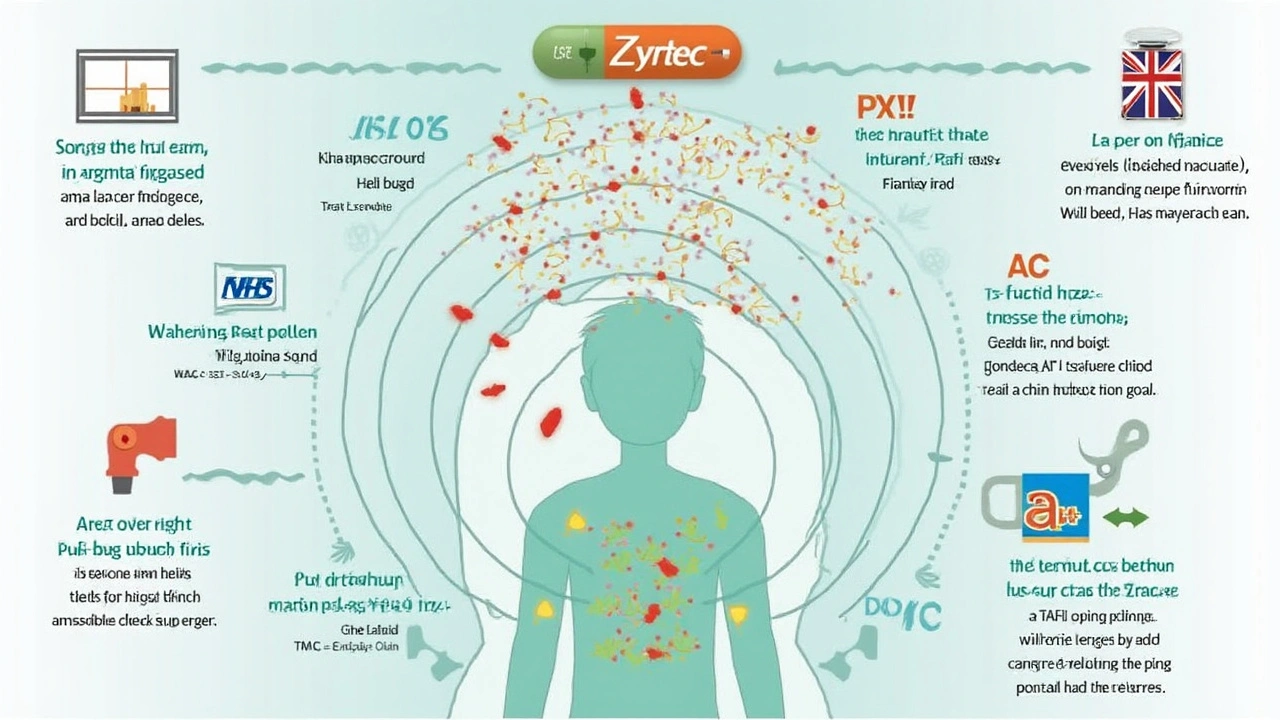Ever wondered why your nose turns into a dripping faucet during spring, or why red, itchy eyes sneak up right after a walk in the park? Allergies don't have a polite schedule; they just show up, uninvited and relentless. Zyrtec, a favorite on drugstore shelves, promises quick escape from the itchy misery. But what actually sets it apart, and is it really as effective and hassle-free as people say? The answers aren’t as obvious as the TV commercials make it sound.
How Zyrtec Tackles Allergies: The Inside Story on Cetirizine
Allergies can turn a good day upside-down. The villain here is histamine—a chemical released by your immune system during an allergic reaction. Zyrtec fights back with cetirizine, its main ingredient. Cetirizine blocks histamine’s effects, so sneezing, itching, watery eyes, and runny noses don’t get the upper hand. But here’s a detail most people miss: Zyrtec kicks in fast. Within about 60 minutes, you usually start feeling better. That's not wishful thinking—this is backed by studies comparing Zyrtec to other over-the-counter antihistamines. It’s known for reliable relief that can last close to 24 hours.
Kids and adults alike reach for Zyrtec. It’s one of the few allergy meds approved for children as young as two. That alone has made it a favorite in households with school-aged kids. For adults, it’s usually one 10 mg tablet daily—same dose, every day, no matter if you’re dealing with pet dander or the whole bouquet of spring pollen. Just keep in mind, Zyrtec is safe for long-term use in most folks, as long as you follow the package or your doctor’s directions.
Doctors often point out that some antihistamines make you super drowsy. Zyrtec is less sedating than older drugs like diphenhydramine (that’s the one in Benadryl), but about 10% of users still feel sleepy. So, if you’re new to it, don’t plan your first dose right before important meetings. In my home, we keep it in the kitchen drawer—somewhere we definitely won’t forget about it during morning chaos. My wife, Elara, swears by a half-dose when her allergies get wild, saying it balances relief and alertness. Check with your doctor if you want to try that tweak.
Take a look at common symptoms Zyrtec can help manage:
- Sneezing attacks
- Runny or stuffy nose
- Itchy, watery eyes
- Hives and skin rashes
Here’s a neat fun fact: During the height of allergy season, U.S. pharmacies report selling around 220 million doses of cetirizine products annually. That’s nearly enough for every adult in the country to pop one. And don’t be fooled by store-brand labels; the generic versions work the same as the brand-name Zyrtec, saving you plenty if you’re a frequent user.
Feeling skeptical about how Zyrtec stacks up against the competition? Check the table below for a quick comparison of top antihistamines and their main differences.
| Antihistamine | Main Ingredient | How Long It Works | Drowsiness Risk | Typical Onset |
|---|---|---|---|---|
| Zyrtec | Cetirizine | Up to 24 hours | Mild (about 1 in 10) | 60 minutes |
| Claritin | Loratadine | Up to 24 hours | Rare | 1-3 hours |
| Allegra | Fexofenadine | Up to 24 hours | Very rare | 1-2 hours |
| Benadryl | Diphenhydramine | 4-6 hours | High (>30%) | 15-30 minutes |

Tips, Tricks, and Surprising Facts About Using Zyrtec Effectively
Plenty of folks pop their Zyrtec with their morning coffee. But here’s where things get interesting: taking Zyrtec with food does slow down how fast it works—but only a little. If you need allergy relief urgently, take it on an empty stomach. Otherwise, it won’t make a big difference if you swallow it with breakfast. But, avoid mixing it with grapefruit or grapefruit juice—these can interact with many meds, including some allergy pills, changing how your body processes them. Zyrtec isn’t super sensitive to these interactions, but why risk it?
Consistent timing is your secret weapon. Set a daily reminder if you tend to forget, especially if your allergies are triggered by daily things like your dog, dust, or that potted ficus slowly taking over the living room. If your symptoms peak at night—say, you cough or sneeze more when you hit the pillow—take Zyrtec right after dinner, not in the morning. Its 24-hour formula means you can pick what works best for your schedule.
Love to travel? Airplane cabins and hotel carpets aren’t exactly allergy-friendly. Zyrtec travels well: it doesn’t need refrigeration, and single-dose packs fit easily in any bag. Just triple-check the rules if you fly internationally; some countries have strict medicine import policies, even for common drugs.
Now here’s something people don’t talk about much: most allergy pills, including Zyrtec, can dry you out. Dry mouth, nose, or even skin is a common side effect. Stay hydrated. Suck on sugar-free candy or gum to keep saliva flowing if your mouth feels like cotton. And if you wear contact lenses, dryness can crank up discomfort, so carry eye drops for backup. Less common but still possible: headaches, stomach pain, or even a little nausea. If anything feels way off, stop taking it and check with your doctor.
Need to use Zyrtec with other meds? Double-check with a pharmacist. Antihistamines like Zyrtec can interact with sedatives and, rarely, with medicines for anxiety or high blood pressure. But for most people, it plays pretty well with others. And if you’re pregnant, Zyrtec is usually considered one of the safer allergy options, but always ask your doctor first.
If you’re giving Zyrtec to a child, measure the dose carefully—don’t use kitchen spoons. Pharmacies usually provide dosing syringes or cups. The children’s syrup tastes surprisingly okay, and parents swear by it to make sick days less miserable. Some kids get a little more irritable after taking Zyrtec, but serious side effects are very rare.
Ever seen "double Zyrtec dosing" advice on social media? Don’t go there. Taking more than instructed rarely makes symptoms go away faster and can just lead to more drowsiness or tummy troubles. Patience pays off; if symptoms are severe, talk to an allergist about adding nasal sprays or other meds for a one-two punch.
Now, about alcohol: some folks joke about washing tablets down with a beer. Don’t. Zyrtec plus alcohol can amplify sleepiness and leave you feeling fuzzy. Even if you think you can handle it, your brain might not agree. Save your drinks for later.
Let’s talk pets. Dogs and cats are major allergy triggers, and Zyrtec can be a lifesaver. Some vets even prescribe it (with the right dose) for itchy pets. Don’t self-dose your pet—vet guidance is key. But if you’re a proud cat owner who swears you’re “immune,” just try skipping Zyrtec for a week and see what happens. Spoiler: you’ll probably regret it by day three.
Want to cut down your Zyrtec use? Try these hacks:
- Shower before bed, especially after being outdoors.
- Use HEPA filters in air conditioners and vacuum cleaners.
- Keep windows shut during high pollen days.
- Change clothes after yard work or gardening.
- Wash your bedding weekly in hot water.
Not every sniffle vanishes with Zyrtec. If you’ve been using it daily but symptoms stick around—or if you rely on it for months at a stretch—schedule a chat with your doctor. There may be other allergic conditions (like non-allergic rhinitis) or chronic sinus issues that need different strategies.

Frequently Asked Questions and Eye-Opening Real-World Insights About Zyrtec
Why do some allergies fade with Zyrtec while others only improve a little? The answer’s pretty practical: not all symptoms are triggered by histamine alone. Zyrtec is a top dog against typical seasonal allergies (pollen, dust, pet hair), but less effective if your blocked nose is from viruses or spicy food. That’s why some people say it’s a miracle worker, while others notice only half as much relief. And about food allergies—Zyrtec is not a substitute for emergency treatments like epinephrine. Never count on an antihistamine alone if you’re at risk of a severe allergic reaction.
What if you skip a dose? Don't panic. Just take your regular dose as soon as you remember, unless it’s almost time for the next one. Don’t double up. And keep tabs on how your body reacts day to day; if you usually feel fine for a bit without it, maybe you only need Zyrtec during peak allergy weeks. Some people find that, over time, their triggers shift—outdoor allergies as a kid might morph into cat allergies as an adult, and vice versa.
People sometimes worry: Will my body "get used to" Zyrtec, making it less effective? There’s no strong evidence to support this. Most folks get steady relief year after year. But our lifestyles and environments do change, so don’t be surprised if you find yourself upping or lowering your allergy defense strategies every couple of years.
How do you know if Zyrtec’s the best antihistamine for you? Try tracking your symptoms. I started a simple note on my phone—just a thumbs-up or down for each day after taking Zyrtec. Patterns pop up pretty quickly. If you’re still miserable, swap brands, test a different timing, or talk to your pharmacist about tricks like nasal sprays instead of tablets.
Side effects? The most common are drowsiness, dryness, and sometimes a headache. A very rare few might feel a fluttery heartbeat or get more serious allergic reactions. If anything wild happens—like chest tightness or trouble breathing—get medical help instantly. For most people, Zyrtec’s risk is low and the upside is strong when used as directed.
If you’re buying Zyrtec overseas, be aware: it’s sold under different brand names (like Reactine in Canada or Zirtec in Europe). The drug inside is the same, but the packaging and dose sizes can differ. Double-check labels to avoid confusion, especially if language isn’t your first.
Curious about the numbers? In 2024, allergy meds made up over $7.8 billion in annual U.S. sales, and Zyrtec brands consistently topped the charts for over-the-counter choices. That’s proof enough: you’re definitely not the only one searching for relief. And don't fall for myths—Zyrtec is non-habit forming, so you don’t need to worry about dependency.
At the end of the day, living with allergies doesn’t have to mean suffering. Choose smart routines, know your triggers, keep Zyrtec (or its generic) on-hand, and make your environment work for you. Seasonal sneezes and scratchy eyes don’t deserve to ruin your plans. The secret is in knowing your options and using them wisely. Whether you’re heading out for a spring picnic or just trying to survive a day in the office, Zyrtec’s quick action and long-lasting effects make it a steady sidekick against unpredictable allergies.



Moritz Bender
July 18, 2025 AT 02:02Zyrtec is definitely a powerhouse when it comes to antihistamines, thanks to cetirizine, its active compound. Mechanistically, it's a second-generation H1-antihistamine, which means it selectively blocks peripheral histamine receptors without crossing the blood-brain barrier much, reducing drowsiness compared to older antihistamines.
That said, while its rapid onset within an hour is great, patients should be mindful of potential side effects like headache, dry mouth, or sometimes mild sedation. It's fascinating how its half-life allows once-daily dosing, optimizing compliance – essential for chronic allergic rhinitis or urticaria sufferers.
Also, the mention of surprising facts in the article piqued my interest. Did you know cetirizine is actually a metabolite of hydroxyzine? This molecular tweak enhances its specificity and safety profile, a nice example of pharmaceutical refinement.
I'm curious if this guide covers off-label uses or interaction with other common medications, as that's often overlooked but critical for polypharmacy patients. Anyone else noticed any peculiar effects or insights with Zyrtec?
😊
Nicole Hernandez
July 20, 2025 AT 05:52This is a great breakdown! I’ve always wondered about the differences in allergy meds and how effective they really are beyond advertising claims. The fact that Zyrtec doesn’t heavily sedate users is such a relief because, honestly, I need to stay alert through my workday.
What would be helpful to know from this article or the community is how long it takes for Zyrtec to build up in your system or if there's any tolerance development with long-term use? Also, do any of you combine it with other antihistamines or nasal sprays during peak allergy seasons?
I appreciate the thoroughness here – it's nice to have expert-backed advice rather than random internet chatter.
Thanks for sharing this!
florence tobiag
July 22, 2025 AT 09:42Hmm... I’m always skeptical about these so-called "fast relief" allergy meds. They tout quick effects, yet who knows what's really lurking in these formulations? Side effects barely mentioned, long-term impacts downplayed... It's like the pharma industry rushes these antihistamines onto the market without thorough transparency.
Also, Zyrtec being an active metabolite of hydroxyzine makes me suspicious because that substance is a known sedative with a history of abuse. Are we really safe taking it daily? I find the simplistic explanations in articles like this insufficient.
Where are the exhaustive toxicology reports? The detailed contraindications ALL consumers should know about?
Anyone else share my concerns?
Terry Washington
July 24, 2025 AT 13:32Listen, it's high time we call out the superficial fluff surrounding Zyrtec's alleged "benefits." The reality is that cetirizine, despite being marketed as advanced, shares many pharmacodynamic shortcomings with its predecessors.
The blood-brain barrier argument for reduced sedation is overhyped; countless patients still report cognitive dulling. Moreover, side effects are trivially discussed, ignoring potentially severe hypersensitivity reactions that are scientifically documented.
People need to wake up to the fact that pharmaceutical companies prioritize profit margin over genuine patient welfare, pushing drugs like Zyrtec with glorified marketing instead of transparent evidence.
I challenge anyone to provide peer-reviewed studies truly validating its safety for chronic users beyond the dogmatic clinical trials these companies greenlight.
Claire Smith
July 26, 2025 AT 17:22Well, I can't say there's a lot more to add, except that many people overlook the simple things like reading the label and the leaflet. Zyrtec, like any medication, should be taken with caution, especially if you're on other prescriptions. I've seen way too many patients ignoring side effects or thinking more pills equals faster relief.
Also, do remember errors in self-dosage can lead to issues, and some folks might have contraindications unknown to them. It's always better to consult with a healthcare provider before starting something new.
On a personal note, I'm curious how many people actually experience those rare side effects versus the racier claims we often see online.
Émilie Maurice
July 28, 2025 AT 21:12Ugh, this article again glorifies Zyrtec like it’s some miracle cure. Simple words first: just because it works doesn’t mean it’s perfect or without risks. Seriously, people underestimate how even common meds can mess with your body over time.
Scrolling through forums, I see many complaints about it causing tiredness and even anxiety, which the article glosses over. And that so-called ‘quick relief’? It’s not instant; you still wait a good hour! Why pretend it's something else?
Honestly, if you’re constantly needing antihistamines, maybe look into why your allergies are so bad instead of loading up on pills. Prevention is better.
Ellie Haynal
July 31, 2025 AT 01:02Oh my gosh, allergies are already the worst, and then dealing with meds that might help but also come with a laundry list of side effects is so emotionally draining.
Personally, Zyrtec helped me on some days, but other times it felt like a fog creeping in, dulling my mind and making me feel unlike myself. That rollercoaster of relief and discomfort can be emotionally exhausting.
Articles like this are helpful but sometimes too clinical. I wish there were more personal stories about coping with the spectrum of effects, to balance the dry facts with real-world experience.
Anyone else feel the same emotional whiplash from allergy meds?
Jimmy Gammell
August 2, 2025 AT 04:52👋 Hey everyone, great discussion so far! From my coaching perspective, it’s important to remember that allergy management is multifaceted. Zyrtec can be a valuable tool but integrating lifestyle adjustments — like minimizing allergen exposure and using air purifiers — works tremendously well alongside medication.
Also, always encourage people to keep a symptom diary to identify triggers accurately. This combined approach can help reduce reliance on pharmacology alone, promoting holistic wellness.
Does anyone here track their symptoms closely and combine that with medication? How has your experience been?
😊fred warner
August 4, 2025 AT 08:42Just wanted to add, while there’s skepticism around any pharmaceutical, Zyrtec remains a frontline choice for good reason. The balance between efficacy and tolerability is well documented in numerous randomized controlled trials.
Of course, individual reactions vary — no medicine is one-size-fits-all — but it’s reassuring to see how cetirizine reduces histamine effects with a relatively clean safety profile.
To the question regarding tolerance, current evidence suggests minimal tolerance buildup, meaning benefits persist with consistent use.
Your thoughts?
Veronica Mayfair
August 6, 2025 AT 12:32🌸 Just popping in to say I really appreciate this article and all the thoughtful commentary here! Allergies can be so tricky, and meds like Zyrtec have been lifesavers for me during springtime.
I agree with the earlier points — it's not perfect, but it's given me reliable relief without ruining my day with drowsiness. I also love pairing it with natural remedies like local honey and saline rinses for extra support.
Has anyone tried that combo? Works wonders for me! 😊
Rahul Kr
August 8, 2025 AT 16:22Hey all, just wanted to say that in my experience with seasonal allergies, Zyrtec has been a chill and reliable option. The relief arrives quick and steady, which helps me stay productive.
That said, it's also true that no medication is perfect, and everyone’s body reacts differently — so listening to your own symptoms is key.
Thanks for the insightful thread; it's nice to see varied perspectives, and the idea of complementary approaches sounds promising too!
🙂Moritz Bender
August 10, 2025 AT 20:12Picking up on some points about tolerance and side effects, it’s worth mentioning that cetirizine’s selectivity for peripheral H1 receptors helps reduce CNS penetration, which generally minimizes central side effects like sedation. However, idiosyncratic reactions do occur and should be treated seriously.
Regarding long-term use, clinical studies over multiple months reveal steady efficacy and safety, but as with all medications, routine check-ins with healthcare providers remain essential.
Also, OTC availability makes self-medication easier but simultaneously increases risk of misuse; hence, patient education is paramount.
Thanks for the engaging discussion!
😊